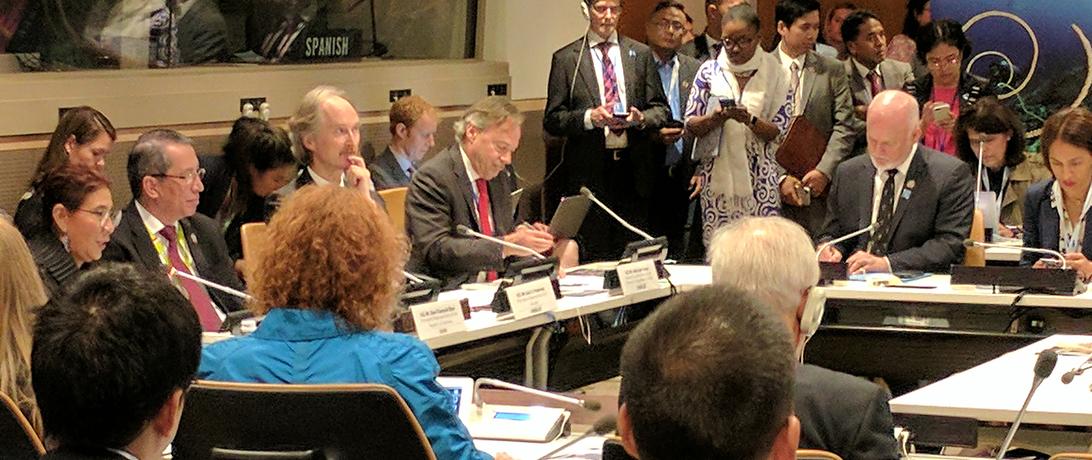
Secure Fisheries’ mission of improving fisheries governance in order to eliminate the root causes of organized political violence, particularly in fragile and post-conflict states, supports the goals of SDG 14.
United Nations Headquarters, New York - During the decade-long tenure of former UN Secretary-General Ban Ki-moon, he was quoted as saying, "We don’t have a plan B because there is no planet B." That sentiment was one of the guiding visions that informed the creation of the United Nations Sustainable Development Goals (SDGs) near the end of his term as Secretary-General in 2015.
The SDGs, officially known as Transforming our World: the 2030 Agenda for Sustainable Development, is a set of 17 global goals aligned with 169 targets. Spearheaded by the United Nations through a process involving all of its 193 Member States, as well as global civil society, the SDGs aim to form a plan of action to better align "people, planet and prosperity," while seeking to strengthen universal peace and eradicating poverty.
According to the SDG charter, "we are determined to foster peaceful, just and inclusive societies which are free from fear and violence. There can be no sustainable development without peace and no peace without sustainable development." The ocean plan of action is being designed at this week's The Ocean Conference held at the UN headquarters in New York City. The conference's overarching goal is to refocus global efforts to achieve the targets under Sustainable Development Goal 14: to conserve and sustainably use the oceans, seas and marine resources for sustainable development.
To do this, The Ocean Conference has brought together more than 5,000 participants, including eight heads of state, seven prime ministers and 77 ministers, and the conference involves more than 150 side events and meetings over five days.
Oceans, and the coastal and marine resources they support, play an essential role in human well-being and social and economic development worldwide. The ocean supports the livelihoods one in every ten people on the planet, including some of the world’s poorest and most vulnerable. It is also the main source of protein for four out of ten people in the world. The oceans are particularly crucial for people living in coastal communities, who represented 37% of the global population in 2010.
Speaking in the UN General Assembly Hall, Secretary-General Antonio Guterres cautioned that, “Improving the health of our oceans is a test for multilateralism, and we cannot afford to fail. The conservation and sustainable use of marine resources are two sides of the same coin.” He went on to say, “We must jointly address the problems of governance that have held us back.” With these comments he called for a new strategic vision of how to govern the oceans and marine resources.
Secure Fisheries’ mission of improving fisheries governance in order to eliminate the root causes of organized political violence, particularly in fragile and post-conflict states, supports the goals of SDG 14. Our focus is advancing SDG target 14.4, which has a goal by the year 2020 of effectively regulating harvest and ending overfishing, illegal, unreported and unregulated fishing, and destructive fishing practices while implementing science-based management plans.
Secure Fisheries is working to advance sustainable fisheries management in the Somali region by increasing the availability of scientific information on fisheries and coastal resources through an interactive, web-based map that identifies important marine habitats, fishing grounds, and user groups of coastal resources. The map will enable Somalis, investors, and the development community to identify areas for development and locations at risk of conflict over resources, and to strategize how to mitigate conflict risk through protections or investment.
Secure Fisheries is also working to strengthen enforcement of laws and prosecution of illegal fishing throughout the Western Indian Ocean by working with partner organizations and regional navies and coast guards to increase maritime domain awareness, enhance data collection on fishing vessels and transshipment vessels, and help coordinate information sharing between states and intergovernmental organizations such as the United Nations Office on Drugs and Crime (UNODC) and Interpol.
As UN Secretary-General António Guterres said this week at The Ocean Conference, “This is our environment; it is the keystone of a sustainable future. Without a healthy environment we cannot end poverty or build prosperity."
For more information on a related event we facilitated earlier this year, click here.
Article Details
Published
Topic
Program
Content Type
Opinion & Insights